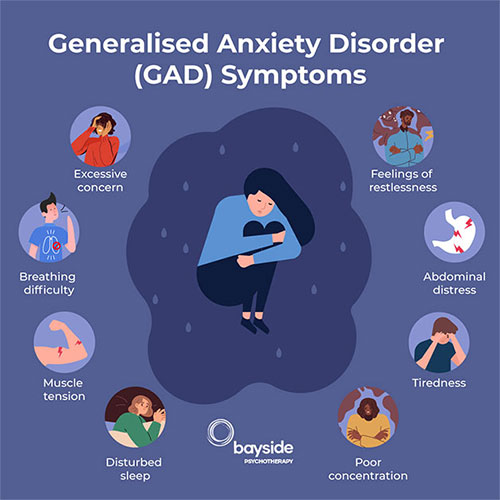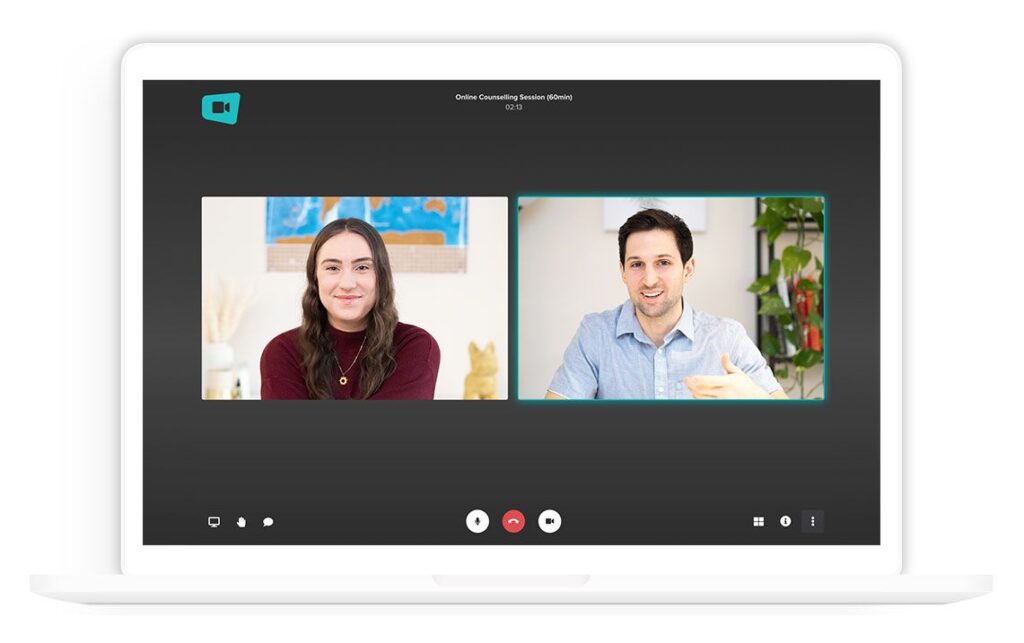How a licensed therapist for anxiety can help you manage daily stress
How a licensed therapist for anxiety can help you manage daily stress
Blog Article
Discovering Different Techniques in Therapy for Anxiety Problem for Long-term Modification
When dealing with stress and anxiety disorders, it's vital to discover a selection of counseling strategies. Each technique offers distinct understandings and devices to assist you handle your signs effectively. You may find that integrating techniques can produce the ideal results. However, recognizing the subtleties of these approaches is vital to fostering long-term change. Suppose the ideal mix could release a new degree of emotional health for you?
Understanding Anxiety Problems: A Quick Introduction
Anxiety problems, which influence countless people worldwide, can considerably influence every day life. You could experience frustrating sensations of anxiety or worry that seem irrepressible. These feelings can lead to physical symptoms like an auto racing heart, sweating, or even lightheadedness. Usual kinds of anxiety problems include generalised anxiety problem, panic attack, and social anxiousness disorder. Each has one-of-a-kind indications, however they all share a tendency to interrupt your regular and relationships.Understanding the root creates of your anxiety is essential. It may originate from genes, brain chemistry, or life experiences. Identifying your triggers can help you manage your feedbacks better. It is necessary to keep in mind that you're not alone in this battle. Numerous individuals face similar challenges, and looking for help is a solid step towards feeling much better. By learning about anxiousness problems, you're already on the path to understanding and managing your condition more efficiently.
Cognitive-Behavioral Treatment: Testing Negative Idea Patterns
In Cognitive-Behavioral Treatment, you'll start by determining the negative thought causes that add to your stress and anxiety. As soon as you identify these ideas, you'll service replacing them with more positive choices. Together, you'll develop effective coping approaches to help manage your anxiousness in day-to-day situations.
Identifying Adverse Thought Triggers

Identifying the particular triggers behind your adverse thoughts can be important in managing stress and anxiety when you experience minutes of distress. Begin by taking notice of scenarios that provoke sensations of fear or fear. Is it a jampacked area, a forthcoming target date, or a discussion with specific people? Write these circumstances in a journal. This will certainly help you identify patterns in your reasoning. Likewise, notice physical experiences that accompany your adverse thoughts, like a racing heart or rigidity in your breast. By pinpointing these triggers, you gain understanding into what's sustaining your anxiousness. Comprehending these connections is the initial step in testing those thoughts and ultimately gaining back control over your emotional reactions.
Replacing Thoughts With Positives
Testing unfavorable thought patterns is a crucial step in transforming your attitude and reducing stress and anxiety. You may often discover on your own trapped in cycles of insecurity or devastating thinking. As opposed to letting these ideas dictate your feelings, technique replacing them with realistic options or favorable affirmations. As an example, when you believe, "I can not manage this," change it to, "I can take care of difficulties one action at once." This simple change can considerably influence your emotion. On a regular basis recognizing and responding to these adverse ideas aids develop a much healthier internal dialogue. Remember, it takes some time and initiative, yet consistently practicing this technique can result in enduring modification, encouraging you to face stress and anxiety with renewed self-confidence and durability.
Structure Coping Strategies Together
Replacing adverse ideas is only the start of managing stress and anxiety properly. To produce long-term change, you require to build coping methods that equip you. Cognitive-Behavioral Treatment (CBT) aids you identify and test those unhelpful idea patterns. With each other, you and your therapist can check out just how these ideas influence your sensations and behaviors.Start by creating useful strategies, like journaling or mindfulness workouts, that permit you to challenge anxiousness head-on. When you face your fears gradually, you'll find out to respond in a different way.

Mindfulness and Acceptance-Based Approaches: Growing Present-Moment Awareness
As you navigate the intricacies of anxiety, including mindfulness and acceptance-based methods can substantially improve your capacity to cultivate present-moment understanding. By focusing on the present moment, you'll find that you can observe your ideas and sensations without judgment (Counseling services for anxiety). This practice assists you recognize your anxiety without feeling overwhelmed by it.Engaging in mindfulness workouts, such as deep breathing, body scans, or led meditations, enables you to ground on your own in your current experience. Acceptance-based techniques urge you to accept your feelings instead of battle against them. They lose their power over you.Incorporating these techniques right into your daily routine can change just how you respond to anxiety when you approve your sensations. You'll develop durability and find out to browse stressful circumstances with better convenience. Ultimately, growing present-moment recognition lays the structure for lasting adjustment, equipping you to lead an extra satisfying life
Direct Exposure Therapy: Confronting Concerns Gradually
Direct exposure treatment aids you challenge your anxieties in a steady means, making it much less frustrating. You'll find out strategies to encounter anxiety-provoking scenarios detailed, while additionally constructing coping strategies to description manage your responses. This technique equips you to take control and decrease anxiety in time.
Gradual Direct Exposure Techniques

When encountering stress and anxiety, slowly confronting your fears can be an effective means to reclaim control. This strategy, recognized as progressive exposure, involves gradually revealing on your own to the circumstances or objects that trigger your anxiety. Beginning with much less daunting circumstances and progressively function your way as much as more difficult ones. As an example, if you're terrified of public talking, you may begin by speaking in front of a mirror, then advance to sharing thoughts with a pal, and at some point resolve a little team. Each action helps desensitize you to the worry, constructing your confidence in time. Bear in mind, it's important to rate on your own and celebrate little success as you relocate via this process, strengthening your capability to take care of anxiety efficiently.
Structure Coping Methods
Building efficient coping approaches is essential for managing stress and anxiety, particularly as you face your anxieties progressively - Counseling services for anxiety. One effective method is exposure therapy, where you start by facing your fears in a controlled way. Start with much less intimidating situations and slowly work your method as much as more difficult situations. This progressive direct exposure aids desensitize you to anxiousness causes, making them much less overwhelming.Incorporate leisure strategies, such as deep breathing or mindfulness, to calm your mind during exposure. Track your progression, commemorating small success along the method to improve your self-confidence. Keep in mind, it's fine to take your time; the goal isn't perfection yet stable renovation. By developing these approaches, you'll encourage on your own to navigate anxiousness and embrace life much more completely
Psychodynamic Therapy: Discovering Source of Anxiousness
Psychodynamic treatment checks out the unconscious mind, revealing the origin of your anxiousness. By examining your ideas, feelings, and past experiences, this method helps you reveal underlying disputes and unresolved concerns that may add to your present anxiousness. You'll work with a specialist to check out childhood experiences, partnerships, and emotional patterns that shape your actions today.As you acquire understanding into these much deeper layers of your mind, you'll begin to acknowledge how previous events affect your existing behavior. This understanding can lead to catharsis, permitting you to refine emotions you might have suppressed.Through the healing read here connection, you can likewise identify defense reaction that might have developed in time, providing a clearer path to transform. Inevitably, psychodynamic treatment equips you with the tools to resolve your anxiety at its core, promoting long lasting improvement in your emotional wellness.
All Natural and integrative Strategies: Integrating Techniques for Greater Effectiveness
Integrating numerous restorative strategies can improve your journey towards managing anxiousness much more effectively. By combining aspects from cognitive-behavioral therapy, mindfulness practices, and holistic strategies, you can develop a customized method that resolves your unique needs. You could use cognitive-behavioral strategies to test adverse idea patterns while including mindfulness workouts to ground yourself in the present moment.Additionally, exploring holistic practices such as yoga or meditation can advertise leisure and minimize stress and anxiety signs. This blend allows you to develop better self-awareness and resilience.Experimenting with these varied techniques can assist you find what resonates most with you. Remember, it has to do with finding a harmony that functions, as opposed to staying with a single method. This integrative method not just uses instant relief however likewise fosters long-term skills for handling stress and anxiety, encouraging you to redeem control over your life.
The Duty of Support Systems: Building Durability Through Connection
While it could seem that managing stress and anxiety is a singular journey, having a strong support system can play an important function in your resilience. Bordering yourself with empathetic friends, family members, or support teams produces a safe area where you can openly share your sensations and experiences. When you attach with others, you remind on your own that you're not the only one in this struggle.These connections offer support and can provide sensible coping techniques that have actually worked for others. It's likewise an opportunity to gain point of view; pals can aid you see situations in different ways, reducing feelings of isolation.Moreover, psychological assistance fosters a sense of belonging, which can considerably alleviate stress and anxiety signs and symptoms. By leaning on your support system, you can develop durability and deal with challenges much more effectively. Remember, getting to out for help is a sign of stamina, and it can make all the distinction in your trip towards taking care of anxiety.
Often Asked Concerns
What Are the Usual Signs And Symptoms of Anxiety Disorders?
You might experience restlessness, tiredness, trouble focusing, irritability, muscular tissue tension, and sleep disturbances. Physical signs can include fast heart beat, sweating, and trembling. Recognizing these indicators early can help you look for ideal support and treatment.
For How Long Does Therapy Commonly Last for Stress And Anxiety Problems?
Treatment for anxiety conditions normally lasts anywhere from a couple of weeks to numerous months. It actually depends on your individual needs, development, and the strategies your specialist utilizes to aid you handle your anxiousness properly.
Can Medicine Be Utilized Alongside Therapy for Anxiousness?
Yes, drug can most definitely be utilized together with therapy for anxiousness. Incorporating both methods typically enhances therapy efficiency, helping you take care of signs while exploring underlying concerns with counseling (Counseling services for anxiety). Constantly consult your health care company for customized advice
Are There Self-Help Methods for Handling Stress And Anxiety?
Yes, there are numerous self-help methods for taking care of stress and anxiety. You can practice mindfulness, participate in routine workout, preserve a well balanced diet, develop a routine, and make use of deep breathing techniques to aid decrease anxiousness symptoms properly.
How Do I Know if I Required Professional Aid for Stress And Anxiety?

Report this page